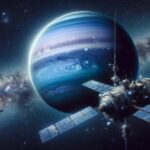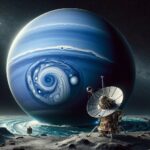Are you ready to embark on a mind-boggling journey beyond our planet? Get ready to be enthralled by the wonders of the universe as we unveil a treasure trove of captivating space exploration facts. In this article, we will take you on an interstellar voyage, delving into the mysteries of distant galaxies, mind-bending cosmological phenomena, and groundbreaking discoveries that have revolutionized our understanding of the cosmos. Prepare to have your imagination ignited and your perspective elevated as we dive deep into the awe-inspiring realm of space exploration. Brace yourself for a cosmic adventure like no other!

Space Exploration Facts
Space, the final frontier. The mere thought of exploring the vast expanse beyond our planet fills us with a sense of wonder and curiosity. But what do we really know about space exploration? Let’s dive into some fascinating space exploration facts that will truly unveil the marvels of our universe.
The Costly Hindrance
One of the biggest hurdles in man’s quest to explore the solar system is the cost. It takes a staggering amount of resources to fund space travel and exploration missions. From building and launching spacecraft to conducting research and development, the price tag associated with space exploration is astronomical. But this colossal investment is crucial for pushing the boundaries of human knowledge and venturing further into the unknown. As Carl Sagan once said, “Somewhere, something incredible is waiting to be known.”
Innovative Writing Tools
When it comes to writing in space, astronauts have a unique set of tools at their disposal. While NASA pens are designed to work flawlessly in microgravity, the Russian astronauts prefer to use pencils, as they eliminate the risk of ink smudging and floating around the spacecraft. It may seem like a small detail, but every aspect of space missions is carefully considered and optimized to ensure smooth and efficient operations. Even something as simple as writing instruments plays a part in the grand endeavor of space exploration.
Astronauts’ Not-So-Flavorful Diet
While we often imagine astronauts indulging in gourmet space cuisine, the reality is quite different. Due to the limited availability of fresh ingredients and the necessity of long shelf life, astronauts’ diets consist mainly of pre-packaged, rehydratable meals. These meals are carefully formulated to provide nutrition while withstanding the harsh conditions of space travel. So, if you ever thought about becoming an astronaut for the food, you might want to reconsider. As the saying goes, “It’s not a feast, but a necessary fuel for the journey of exploration.”
Bathroom Brawls in Space
Living in close quarters with limited privacy can lead to some interesting predicaments, and that holds true even in the vastness of space. Astronauts often experience bathroom bust-ups, as the facilities aboard the spacecraft are limited and require strict schedules for usage. From queue management to ensuring proper waste disposal, astronauts must adhere to strict protocols to maintain cleanliness and hygiene. It’s safe to say that even in space, bathroom etiquette is of utmost importance. As they say, “Even in zero gravity, proper space manners matter.”
Studying Space from Earth and Beyond
Space exploration encompasses various methods of studying the cosmos. Observing space from the surface of Earth using telescopes allows astronomers to gather valuable data and unravel the mysteries of the universe. But the exploration doesn’t stop there. Scientists also utilize satellites, space-based telescopes, unmanned spacecraft, and human spaceflight to physically explore the wonders of space. These scientific endeavors not only expand our knowledge but also ignite our collective imagination. As Arthur C. Clarke famously said, “The only way to find the limits of the possible is by going beyond them into the impossible.”
A Rich History
The exploration of objects in outer space has captivated humanity since ancient times. Even before recorded history, our ancestors gazed up at the night sky in awe and contemplated the celestial bodies. From ancient civilizations mapping constellations to the groundbreaking achievements of modern space missions, the fascination with space exploration has endured throughout human history. It is a testament to our innate desire to understand our place in the universe. As Albert Einstein once remarked, “The most beautiful experience we can have is the mysterious. It is the fundamental emotion that stands at this cradle of true art and true science.”
In conclusion, space exploration is a testament to human curiosity, ingenuity, and our relentless pursuit of knowledge. From the gargantuan costs involved to the innovative tools used, every aspect contributes to the grand endeavor of exploring the universe. So let us continue to unravel the marvels of space, inspire future generations, and ignite the spark of discovery. As Neil Armstrong left his mark on the moon, so too can we leave our mark on the cosmos.
“Space exploration is not just about the stars we see, but the dreams we dare to chase.”
If you’re fascinated by space exploration and want to uncover some mind-blowing facts about the rocket ship, you’re in for a treat! Explore our exclusive compilation of the most intriguing and awe-inspiring insights into the world of rockets. From their history and evolution to their incredible capabilities, get ready to be amazed. Unleash your inner astronaut by clicking here and diving into the mesmerizing world of rocketry: facts about the rocket ship. Let the journey begin!
FAQ
Question 1: What are the major hindrances to man’s exploration of the solar system?
Answer 1: The cost of space travel remains one of the biggest hindrances to man’s exploration of the solar system. The expenses involved in developing and launching spacecraft, as well as maintaining and supporting astronauts during space missions, are significant.
Question 2: What writing instruments are used in space by astronauts?
Answer 2: In space, astronauts use NASA pens and Russian pencils. These writing instruments are designed to work in microgravity conditions, where regular pens would not function properly due to the lack of gravity.
Question 3: What kind of diet do astronauts have during space missions?
Answer 3: Astronauts have a rather limited and dull diet during space missions. Their meals consist mainly of freeze-dried and pre-packaged foods. These meals are specifically prepared to provide the necessary nutrients while being lightweight and easy to store.
Question 4: Do bathroom bust-ups occur in space?
Answer 4: Yes, bathroom bust-ups are not uncommon in space. The microgravity environment poses unique challenges for using the bathroom, and astronauts must follow strict procedures to ensure waste management. Any issues with the systems can lead to disruptions and possible conflicts among the crew.
Question 5: How can space be explored and studied from Earth?
Answer 5: Space can be studied from the surface of Earth using telescopes. Astronomers observe celestial objects and phenomena by analyzing the light they emit or reflect. Additionally, physical exploration of space is conducted with the help of satellites, space-based telescopes, unmanned spacecraft, and human spaceflight.
- China II Review: Delicious Food & Speedy Service - April 17, 2025
- Understand Virginia’s Flag: History & Debate - April 17, 2025
- Explore Long Island’s Map: Unique Regions & Insights - April 17, 2025
















